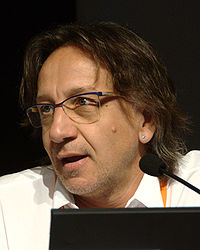- Michele Boldrin
-
Michele Boldrin 
Michele Boldrin in Trento, Italy for the Festival of Economics 2010Nationality Italy and USA Institution Washington University in St. Louis Field Macroeconomics, General equilibrium, Public Policy Alma mater Ca' Foscari University of Venice, University of Rochester Contributions Policy functions, Dynamic programming, Endogenous Fluctuations and Chaos in Dynamic Models, Growth Theory Information at IDEAS/RePEc Michele Boldrin (b. August 20, 1956) is an Italian American economist, expert in economic growth, business cycles, technological progress and intellectual property. He is currently the Joseph Gibson Hoyt Distinguished University Professor in Arts and Sciences and chair of the Department of Economics at Washington University in St. Louis. Along with his colleague and coauthor David Levine, he was part of the group of 200 economists publicly opposing the 2009 Stimulus bill.[1] He later publicly defended his position on the issue in various international media, including a public debate with Brad DeLong.[2]
Contents
Biography
Boldrin was born and raised in Padova, Italy, and later moved to Venice.[3] He did his undergraduate studies at the University of Venice. He then received his M.S. (1985) and Ph.D. (1987) in economics from the University of Rochester in New York, under the supervision of Lionel McKenzie.[4] Before moving to St. Louis in the Fall of 2006, he worked at University of Chicago (1986–87), UCLA (1987–94), Kellogg School of Management (1990–94), Universidad Carlos III de Madrid (1994–99), and University of Minnesota (1999–2006). He is a research fellow at the Federal Reserve Bank of St. Louis since 2006.
He is a Fellow of the Econometric Society, a past Associate Editor of Econometrica and (past) Editor and (current) Associate Editor of the Review of Economic Dynamics, among other academic journals. He (co-)wrote four books and was a visiting professor in Barcelona, Rio de Janeiro, Mexico City, Tokyo, and a number of other places. He is affiliated with CEPR and FEDEA. He is one of the founding editors of the (Italian) blog noiseFromAmerika and he contributes regularly to Against Monopoly and Nada es Gratis, which are respectively in English and Spanish. His two most recent books are Against Intellectual Monopoly,[5] coauthored with David K. Levine (CUP, 2008) and Tremonti, istruzioni per il disuso,[6] coauthored with Alberto Bisin, Sandro Brusco, Andrea Moro and Giulio Zanella (Ancora, 2010), in Italian.
Boldrin is a member of the Board of Trustees and the Scientific Council of Foundation IMDEA Social Sciences.
Research
Michele Boldrin conducts ongoing research in dynamic general equilibrium theory, focusing specifically on the sources of business fluctuations, growth and development, technological innovation, and intellectual property. Collaborating with David K. Levine, Boldrin examines the role played by competitive versus monopolistic markets in growth and innovation. They posit that little evidence exists for the presence of increasing returns at the aggregate level, and thus argue that there is no reason to believe that increasing returns play an important role in actual economic growth. This implies that, in theory as in practice, competitive markets favor and promote continued growth and innovation, whereas monopoly power is not necessary and probably harmful to technological change and economic development. Their theory concludes that existing claims for the necessity of intellectual property in the process of growth and innovation are greatly exaggerated.
References
- ^ Economists object to Obama stimulus plan, Washington University Press Release.
- ^ SMACK! Economics scholars debate pros, cons of stimulus package, UC Davis News release.
- ^ Michele Boldrin, Joseph Gibson Hoyt Distinguished Professor in Arts & Sciences and Chair, Washington University Press Release.
- ^ Boldrin's Autobiography
- ^ [1]
- ^ [2]
External links
Categories:- 1956 births
- Living people
- American economists
- Washington University in St. Louis faculty
- University of Rochester alumni
- Intellectual property activism
- People from Padua
- People from St. Louis, Missouri
- University of Minnesota faculty
- Northwestern University faculty
- Fellows of the Econometric Society
Wikimedia Foundation. 2010.
